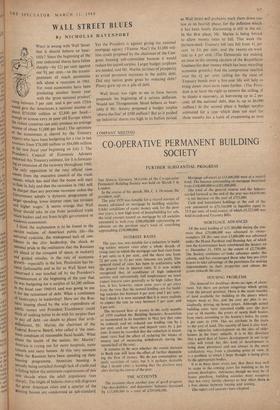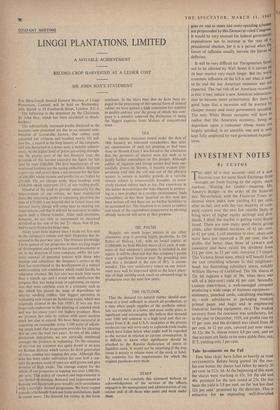WALL STREET BLUES
By NICHOLAS DAVENPORT
WHAT is wrong with Wall Street that it should behave so bear- ishly? Since the beginning of the year industrial shares have fallen sharply—by 121 per cent. against our 91 per cent.—to the accom- paniment of much pessimistic talk about a recession in 1961. Yet most economists have been predicting another boom year with the 'gross national product' rising between 5 per cent. and 6 percent. (This Would give the Americans a national income of about $510,000 million or $2,800 per head— enough to arouse envy in poor old Europe where Me richest countries can only produce an average Income of about $1,000 per head.) The optimism of the economists is shared by the Treasury experts who have been budgeting for a rise in tax revenues from $78,000 million to $84,000 million .sin the new fiscal year beginning on July 1. The President's Council of Economic Advisers endorsed this Treasury estimate, for it is forecast- ing an extension of the recovery throughout 1960. The only opposition to the rosy official view comes from the executive council of the trade unions, which has said that the boom will start 1.° fade in July and that the recession in 1961 will be sharper than any previous recession unless the Government adopts 'a dynamic programme of toger spending, lower interest rates, tax revision and higher wages.' It seems strange that Wall Street should take its cue from jaundiced trade union leaders and not from bright government or academic economists.
I think the explanation is to be found in the current malaise of American public life—the universal cynicism, the widespread lack of con- fidence in the elite leadership, the shock to national pride in the realisation that the Russians are ahead in the conquest of space, in rocketry and guided missiles, in the rate of economic growth—especially in the last. Pessimism has be- come fashionable and as far as Wall Street was concerned it was touched off by the President's announcement at the beginning of the year that he was budgeting for a surplus of $4,200 million nt the fiscal year 1960-61 and was going to use It for the retirement of debt What a confession Of bankruptcy in leadership! Here are the Rus- sians leaping ahead by the wise expenditure of Public money and President Eisenhower could think of nothing better to do with his surplus than to Pay off debt—no doubt to please that arch- deflationist, Mr. Martin, the chairman of the Federal Reserve Board, who called it 'the mini- ilium condition of reasonable fiscal health.' What about the health of the nation. Mr. Martin? America. is crying out for more hospitals, more schools and more houses. At this very moment When the Russians have been speeding up their housing programme, American housing is actually being curtailed through lack of credit and Is falling below the minimum requirements of this new decade when the adult population rises y. The blight of hideous slums still disgraces the great American cities and a quarter of the existing houses are condemned as sub-standard. Yet the President is against giving the national mortgage agency ('Fannic Mae') the $1,000 mil- lion credit proposed by the chairman of the Con- gress housing sub-committee because it would reduce his sacred surplus. Larger budget surpluses are needed, said Mr. Martin, in times of prosperity to avoid persistent increases in the public debt. Did any nation grow great by reducing debt? Plenty grew up on a pile of debt.
Wall Street was right to see in these barren proposals the beginning of a serious deflation. Would not Throgmorton Street behave as bear- ishly if Mr. Amory proposed a budget surplus 'above-the-line' of £500 million? But as it pushed up industrial shares too high in its bullish period, so Wall Street will probably mark them down too low in its bearish phase, for the deflation which it has been busily discounting is still in the air. In the first place, Mr. Martin is being forced to allow money rates to fall. This week the thirteen-week Treasury bill rate fell from 41 per cent to 3.6 per cent. and the twenty-six-week rate to 4 per cent. (The Democrats are making an issue in the coming election of the Republican fondness for dear money which has been retarding economic growth.) And the compromise reached over the 41 per cent. ceiling for the issue of Treasury bonds over a live-year life will help to bring down short-term rates further. (The Presi- dent is to have the right to remove the ceiling. if he thinks it necessary, in borrowing up to 2 per cent. of the national debt, that is, up to $6,000 million.) In the second place a budget surplus estimated for a year which does not start for three months has a habit of evaporating as time goes on and as more and more spending scheme are propounded by this Democrat-ruled Congress' It would be very unusual for federal government expenditures not to increase in the year of a presidential election, for it is a period when the forces of inflation usually outvote the forces of deflation.
It will be very difficult for Throgmorton Streel not to be affected by Wall Street if it carries on its bear market very much longer. But the world economic influence of the US is not what it used to be and the last American recession was not exported. The real risk of an American recession is that it may induce a new American administra• tion to become more protectionist. But there is good hope that a recession will be averted by cheaper money and more government spending, The next White House occupant will have to realise that the American economy, being sc dependent upon a consumer whose wants are largely satisfied, is an unstable one and is only kept fully employed by vast government expends. tures.











































 Previous page
Previous page